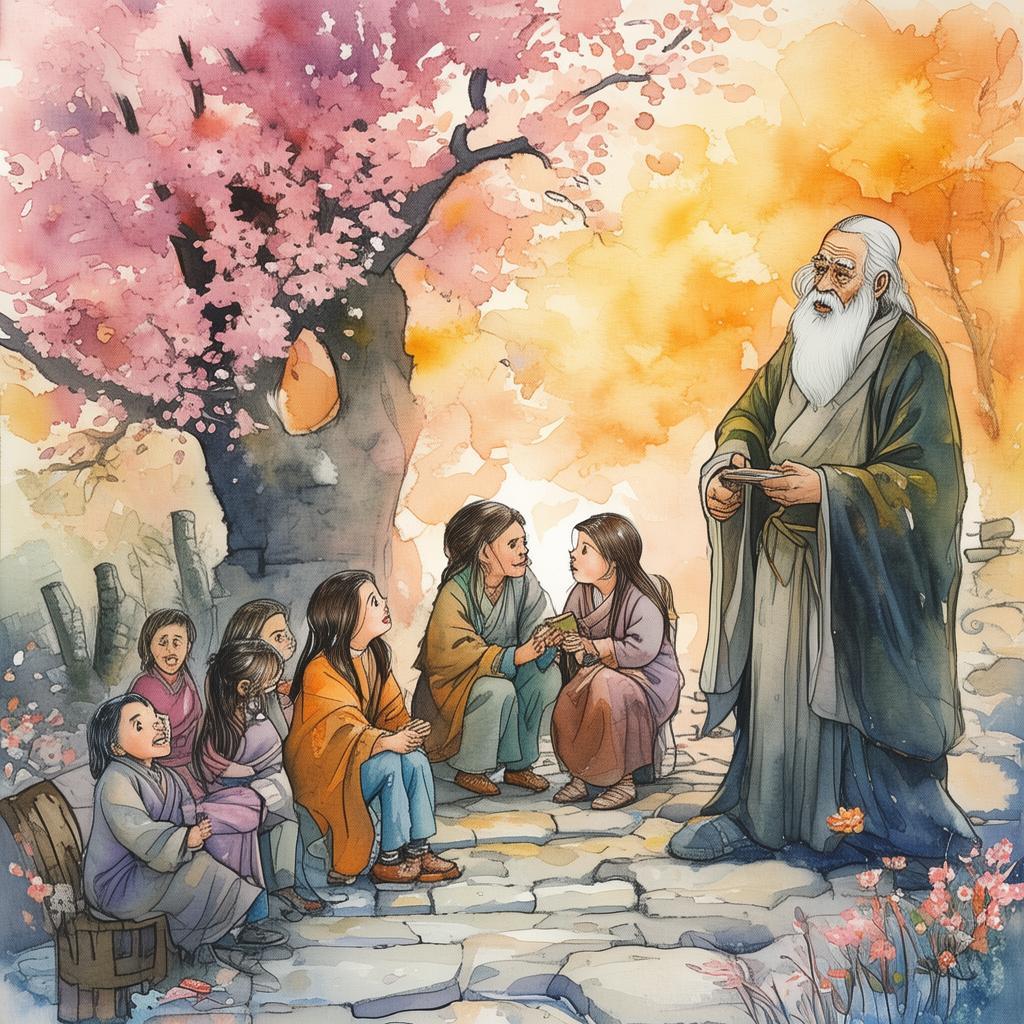Confucius' Dilemma: The Paradox of Virtue and Tragedy
In the serene town of Lu, during the Spring and Autumn period, the great philosopher Confucius walked the cobblestone streets, his thoughts as deep as the rivers he often crossed. The townsfolk revered him, seeking his wisdom in the most mundane aspects of life. Yet, Confucius often found himself in the crosshairs of a paradox that would define his teachings and the legacy of his philosophy.
One evening, as the sun dipped below the horizon, casting a golden hue over the town, Confucius received a letter. It was from his old friend, Master Yi, who was known for his adherence to the ancient ways and his unyielding commitment to righteousness. Master Yi was in dire straits, and he sought Confucius' counsel.
"The State of Song is on the brink of civil war," Master Yi wrote. "The ruler is corrupt, and the people are suffering. I have taken up arms to restore justice, but I am alone. I fear the outcome will be a tragedy for our people. Should I continue, or is it time to reconsider my path?"
Confucius pondered the letter, the weight of Master Yi's plight pressing heavily on his heart. He knew that Master Yi's quest for righteousness was noble, but he also understood the dangers that lay ahead. The thought of a friend facing a tragic fate was a specter that haunted his mind.
As the moon ascended, illuminating the path ahead, Confucius made his decision. He would visit Master Yi and share his wisdom, hoping to guide him toward a path less fraught with peril.
When Confucius arrived at Master Yi's camp, he found his friend surrounded by weary soldiers, their faces etched with determination and fear. Master Yi greeted him warmly, his eyes reflecting the weight of his burden.
"Confucius, I am at a crossroads," Master Yi began. "Should I continue my quest for justice, or is it folly to stand against the might of the State of Song?"
Confucius sat beside Master Yi, his presence a calming balm to the anxious soldiers. "Master Yi, you must understand that virtue is not without its trials. The path you tread is fraught with peril, but it is also the path of righteousness. Remember the words of the ancients: 'A virtuous man may be without honor in the eyes of the world, but he is never without honor in his own eyes.'"
Master Yi nodded, but his doubts remained. "Yet, what if the cost of my virtue is the suffering of countless innocent lives? Can I truly be virtuous if I must bring about a tragedy?"

Confucius smiled, his eyes twinkling with the wisdom of ages. "Virtue is not a single act, but a continuous journey. You may not be able to control the outcome, but you can control your actions. The greatest act of virtue is to face adversity with courage and integrity."
Days turned into weeks as Master Yi and his band of soldiers held their ground against the overwhelming forces of the State of Song. The battle was fierce, and the casualties were high. Despite the odds, Master Yi remained steadfast in his quest.
In the end, the State of Song was defeated, and Master Yi's sacrifice was recognized. Yet, the victory was bittersweet. The town of Lu was left in ruins, and many innocent lives had been lost.
Confucius visited Master Yi in his tent, the air thick with the scent of defeat and victory. "Master Yi, your quest for justice has brought about a change, but at a great cost. The question remains: Is it ever possible to be virtuous without suffering tragic consequences?"
Master Yi looked at Confucius, his eyes reflecting the turmoil of his soul. "I do not know, Confucius. I only know that I did what I believed to be right, and in doing so, I have honored my own heart."
Confucius nodded, his face a mask of contemplation. "Then, you have found the true essence of virtue. It is not about the outcome, but about the journey. In your heart, you have remained true to the path of righteousness, even in the face of tragedy."
And so, the tale of Master Yi and Confucius became a cautionary parable, a testament to the eternal struggle between virtue and tragedy. It was a story that would be told for generations, a reminder that the pursuit of virtue is often a difficult and sometimes tragic journey, but one that is essential to the human spirit.
As the story of Master Yi and Confucius spread, it became a beacon of hope and a source of wisdom. It taught that while tragedy may accompany the pursuit of virtue, the courage to face adversity and the integrity to stay true to one's path are the true measures of a virtuous life.
✨ Original Statement ✨
All articles published on this website (including but not limited to text, images, videos, and other content) are original or authorized for reposting and are protected by relevant laws. Without the explicit written permission of this website, no individual or organization may copy, modify, repost, or use the content for commercial purposes.
If you need to quote or cooperate, please contact this site for authorization. We reserve the right to pursue legal responsibility for any unauthorized use.
Hereby declared.









